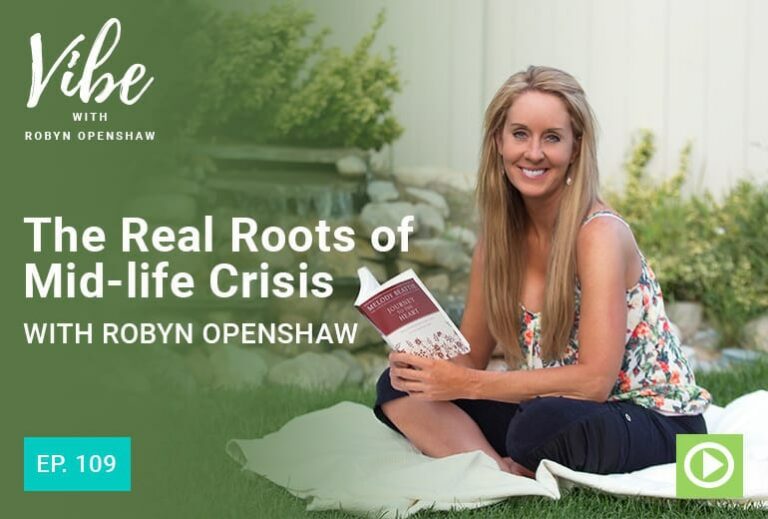Ep. 109: The Real Roots of Mid-life Crisis with Robyn Openshaw

Podcast: Play in new window
In this episode we learn about why people tend to be happier as they get older. Robyn dives deep into some of the science and research behind what really makes people happy. She shares excerpts from a major article that talks about the “U-Curve of Happiness” and how it can apply to our own lives no matter what age and stage we may be in. In connection with the “Learn from Our Elders” series, this article and Robyn’s personal comments and insights on it, teaches us some great ways to learn to let go more, to love more, to be more grateful, and to truly find great happiness in our mid-life, or any stage of life.
LINKS AND RESOURCES:
Read the full article from The Atlantic: CLICK HERE
Learn more about the Swiss Mountain Clinic: CLICK HERE
Sign up for the Free Detox Video Masterclass: CLICK HERE
TRANSCRIPT:
Hey there. It’s Robyn Openshaw and I’m the host of The Vibe Show and Welcome Back.
I’m going to be in Europe, hiking from the top to the bottom of Portugal with my daughter Emma, who just graduated college in May and then I’m taking her to the Swiss clinic of biological medicine that I take people to every summer. It’s the most amazing place I found in my research tour of 20 different clinics.
Originally I was studying non-toxic cancer treatment. Uh, this clinic does a lot more than that though. They do really well with Lyme disease and with neurological disease. And those two are really linked. If you’re interested in coming with us in Summer 2019, be sure to message us on the GreenSmoothieGirl page on Facebook and they can give you a link to learn more about the trip.
My daughter, Emma actually isn’t sick, but two years ago she had a grand mal seizure. Luckily just one. And you know, luckily we haven’t had any symptoms since then. I’m watching her closely, currently she’s living with me. I wanted to do more testing in this clinic of biological medicine that I’ve come to really trust and have gotten really close to the medical doctors there. And I just wanted some functional medicine professionals to impress on her what I myself struggle to do, which is to help her understand that she has to care for her immune system and she has to decrease her toxic load if she wants to be healthy in the long term.
And then after that I’m speaking at Fran Drescher’s cancer event. I’m speaking on EMF, which is really an apropos subject for this podcast. We’ve done several episodes on how EMF is connected to cancer and other risks. So Fran Drescher is interviewing me on stage about it. You probably remember her as “The Nanny” on the 1990’s TV show. And I love celebrities who use their fame for humanitarian causes.
So like me and like my quote unquote brother Chris Wark, who I’ve interviewed twice here on the show and he’s in our top 10 downloads. So I assume that you liked my interviews with him. Fran, is super interested in helping other people diagnosed with cancer, like she was. To learn what other methods they have available to them beyond just chemotherapy and radiation. So I’m not being paid for this talk. I wasn’t paid to keynote the “Energy Healers Conference” in St George, Utah that I spoke at either. I don’t really care about being paid to speak so much as I really care about sharing what I’ve learned in over 50 years on the planet, doing some really specific and very deep research that might serve others.
So it’s really appropriate given that we’ve been doing our “Learn From Our Elders” series to celebrate two years on the air with the show and our hundredth episode. The “U Curve of Happiness” is about aging. We’ve talked about some aspects of aging on this show, but today, I really like this topic, I want to talk about why people in their fifties are happier than people in their thirties and forties. Every time someone does a study on this and there have been a bunch of them. Researchers find the same thing, that the older people are, the happier they are. And when they report on that in the media, nobody believes them.
They say, wait, you don’t look as good when you’re in your fifties, sixties, seventies, and beyond. You start having health problems. Then why wouldn’t the young and the beautiful be the happiest? Well, if you’re listening to this and you’re over 50, you’re probably nodding your head and thinking, yeah, young ones. It’s true. There’s just some stuff we figure out when we’re 50 and older that help us be a lot happier.
Well, the craziest thing is some of these studies on how happy people are at each season of life have controlled for economics, race, and other factors so that you can’t look at the studies and say, well, those people are happier because they have money or those people are happier because they’re in the first world. Would you believe that people in the first world and the third world are both happier in their fifties and beyond? Would you believe that animal studies show that older animals are happier and more peaceful in their fifties or the equivalent in animal years and beyond? So it’s really fascinating, isn’t it?
I’m diving deep today into a journalistic story that was published in “The Atlantic” from almost four years ago in 2014. My best friend from childhood sent it to me. She had told me about it when earlier this year she flew to San Diego where I was attending several back to back conferences in March and I was speaking at one of them and then I had 36 hours in between two of them that we spent together and that’s pretty much how it’s been for her and me. We steal a day or two here and there for the last 40 years of being friends.
And the older I get, the more I realize that if I’ve been friends with someone for almost 20 years, like I have Kristin who I did a podcast episode with. We’ve worked together full time for eight years. We’ve been friends for 17 years, friends like that, I will go to the mat for because you just don’t get that many friends that you have for 20 or 40 years.
So this longest best friend of my life I’ve known since the first day of seventh grade. We met in the “gifted and talented” English class on our first day of Junior High School. She’s been married now for about as long as I was married. Twenty years or so. She got married significantly later than I did. She got an MBA from Stanford. She was number one in her class there. And her husband is somewhat younger than she is. And we had been talking about sort of his midlife transition or a bit of, you know, we all may go through some kind of existential crisis in midlife. We were talking about how she would love for him to be happier and she told me about the “U Curve of Happiness” and told me about this article I’m going to talk about in this episode. And then she later texted me a link to it and I’m really fascinated.
I think the best thing to do here is probably to read you the first page or two. And then I’ll share some of the statistics and the thoughts from the rest of the article because it’s a really long article. We will link you to it in the show notes. And then I’ll share just a little bit of my own reaction, some of why this article resonated so much for me. The article in “The Atlantic” is called “The Real Roots of Midlife Crisis” by Jonathan Rauch. The subtitle is: “What a growing body of research reveals about the biology of human happiness—and how to navigate the (temporary) slump in middle age.” Good stuff. Right? Okay. Let me read for you the beginning of this article.
“This Summer, a friend called in a state of unhappy perplexity. At age 47, after years of struggling to find security in academia, he had received tenure. Instead of feeling satisfied, however, he felt trapped. He fantasized about escape. His reaction had taken him by surprise. It made no sense. Was there something wrong with him? I gave him the best answer I know. I told him about the U-curve.
Not everyone goes through the U-curve. But many people do, and I did. In my 40s, I experienced a lot of success, objectively speaking. I was in a stable and happy relationship; I was healthy; I was financially secure, with a good career and marvelous colleagues; I published a book, wrote for top outlets, won a big journalism prize. If you had described my own career to me as someone else’s, or for that matter if you had offered it to me when I was just out of college, I would have said, “Wow, I want that!” Yet morning after morning (mornings were the worst), I would wake up feeling disappointed, my head buzzing with obsessive thoughts about my failures. I had accomplished too little professionally, had let life pass me by, needed some nameless kind of change or escape.
My dissatisfaction was whiny and irrational, as I well knew, so I kept it to myself. When I thought about it—which I did, a lot—I rejected the term midlife crisis, because I was holding a steady course and never in fact experienced a crisis: more like a constant drizzle of disappointment. What annoyed me most of all, much more than the disappointment itself, was that I felt ungrateful, the last thing in the world I was entitled to be. Hopeful that rationality might prevail, I would count my blessings, quite literally—making lists mentally, and sometimes also on paper of all that I had to be thankful for. Reasoning with myself might help for a little while, but then the disappointment would return. As the weeks turned into months, and then into years, my image of myself began to change. I had always thought of myself as a basically happy person, but now I seemed to be someone who dwelt on discontents, real or imaginary. I supposed I would have to reconcile myself to being a malcontent.
As I moved into my early 50s, I hit some real setbacks. Both of my parents died, one of them after suffering a terrible illness while I watched helplessly. My job disappeared when the magazine I worked for was restructured. An entrepreneurial effort—to create a new online marketplace that would match journalists who had story ideas with editors looking for them—ran into problems. My shoulders, elbows, and knees all started aching. And yet the fog of disappointment and self-censure began to lift, at first almost imperceptibly, then more distinctly. By now, at 54, I feel as if I have emerged from a passage through something. But what?
Long ago, when I was 30 and he was 66, the late Donald Richie, the greatest writer I have known, told me: “Midlife crisis begins sometime in your 40s, when you look at your life and think, Is this all? And it ends about 10 years later, when you look at your life again and think, Actually, this is pretty good.” In my 50s, thinking back, his words strike me as exactly right. To no one’s surprise as much as my own, I have begun to feel again the sense of adventure that I recall from my 20s and 30s. I wake up thinking about the day ahead rather than the five decades past. Gratitude has returned.
I was about 50 when I discovered the U-curve and began poking through the growing research on it. What I wish I had known in my 40s (or, even better, in my late 30s) is that happiness may be affected by age, and the hard part in middle age, whether you call it a midlife crisis or something else, is for many people a transition to something much better—something, there is reason to hope, like wisdom. I wish someone had told me what I was able to tell my worried friend: nothing was wrong with him, and he wasn’t alone. “
So that’s the excerpt I wanted to share with you and I’ll share a few other great tidbits from this amazing article because I want those of you who are in your thirties and forties to realize that the best is yet to come. And if you’re in that funk, who’s nadir, that nadir being the bottom of the U-curve, just like the zenith is the high point, you should know that when you come out of it, you really do come out into the light.
There was an economist in the 1970’s named Richard Easterlin, then at the University of Pennsylvania. He did a Meta-analysis of all the research on happiness of people all over the world. And what he discovered came to be known as the Easterlin paradox. And that is that beyond a certain point of wealth, people do not get happier. I think adjusted for inflation, it’s something like $75,000 a year of family income. So once you have enough money to finance a decent lifestyle, more money does not actually make you happier. This is interesting given that everybody says “money can’t buy happiness”, but nobody really believes it. Do they?
Personally, I think the reason they don’t believe it is that a big lack of money can definitely buy you some unhappiness. If you’re stressed about things like food and shelter, maybe even if you’re completely unable to help your children with college, it’s possible that this creates stress that very negatively impacts your overall life satisfaction and even your daily happiness. I’m putting a link to this very long article from “The Atlantic” in the show notes for those of you who are really into this and you want to read the whole thing, but just a warning, it’s really, really long.
But back to Easterlin, he was kind of considered a weirdo for doing this kind of research in economics until 20 years later, some other economists jumped in, David Blanchflower of Dartmouth and Andrew Oswald of the University of Warwick, for instance. They looked at countries all over the world and they found some interesting things. All over the world, life satisfaction declines through your twenties, thirties and forties, and then it goes up dramatically and people in their fifties and beyond report more happiness and life satisfaction than very young adults do. Who as we all know, when you’re 21, you think everything’s gonna go your way. You have white picket fences in your mind. You dream big dreams, the world’s your oyster. Nothing really bad has happened to you yet, and so you’re generally extremely optimistic.
Another economist, Carol Graham, studied Peruvians and she found that those who emerged out of poverty felt worse off than those who had stayed poor. She found the same u shaped pattern at first in Latin America and then around the world. So there was something about the human condition, but what was it? Keep in mind that these surveys, all of them are not measuring your moment to moment mood. They are measuring satisfaction with your life as a whole.
So there’s a 2008 study by two of the economists I’ve already mentioned that found that the nadir, that bottom part of the U-curve is age 46 on average in 55 of the 80 countries that they surveyed. In all but nine of the 80 countries, they found that the U-curve bottomed out somewhere between the ages of 39 and 47. The average nadir was about the late forties, almost across the board. In some of the studies where the researchers are really precise about controlling for variables like income, marital status, employment status, and so on, so that they can isolate age, there’s a pattern there that’s pretty undeniable and it has very little to do with life circumstances.
Blanchflower and Oswald found that the decrease in life satisfaction from the age of 20 to 45 is about one third the negative impact of being involuntarily unemployed. Now you know how having no job, no income can devastate your life, right? That’s one of the biggest predictors of deep clinical depression. And one third of that happens almost across the board just by aging from the age of 20 to the age of 45. There’s also an interesting correlation here that people in their late forties are the most likely to be on antidepressants. And Oswald later led five scholars in studying primate state of mind as well. What they found is staggering. They surveyed zookeepers, animal researchers and other animal caretakers, and they found that the well-being of primates bottoms out at about 45 to 50 years old too.
So the author of this article that I read to you from Rauch said, “I talked to a bunch of people in midlife and while this isn’t very scientific, what I found is that being happy in midlife is entirely possible. It’s just harder.” One of the people he interviewed and I think you might relate to this, described his twenties as exciting and fun. Then, his thirties, were a time of hard work and steady rewards. But then in his forties he went through an unexpected divorce, single parenthood and a heart attack.
I could really relate to all that except for the heart attack. Nothing really bad happened to me in my twenties and thirties and then in my forties, Bam! Lots of stuff. Divorce, single parenthood, teenagers doing things I didn’t like. People in their forties have often reached a state of some financial stability and they feel bad about talking about their dissatisfaction because they feel like they should be content. Professionally, a lot of us look pretty good on paper by then, but in our forties, many of us fantasize about having a completely different life. Luckily, here’s the good news. The odds are in your favor.
Even though you arrive in your fifties, having potentially lost a parent, gone through a divorce, maybe had a major health catastrophe, maybe even losing a child or having your teen or young adult kids do some really rough things, perhaps getting laid off or losing a job somehow. Despite these things, you develop some values that aren’t entirely related to your work. These give you stability and they make you feel more grounded. You sort of develop this dark sense of humor, which is pretty funny and useful at a party, right?
You might by that age have learned to compartmentalize and not worry about everything all at once, which is a skill most 30 somethings haven’t yet developed. People in their fifties have developed a strong sense of being in the now and feeling grateful for the now, being grateful for the small things that happen. We notice them and we take note. By your fifties, you develop gratitude, that isn’t necessarily inherent in the striving of our thirties where we’re trying so hard to climb a ladder, a career ladder, running kids around. The gratitude we develop by our fifties serves us in being more satisfied and also in being more giving. You all know that the grateful people, the people who spend time in service are the happier people.
So this author Jonathan Rauch talks about his own U-curve and how at the age of 54 when he wrote this article for “The Atlantic”, he realized that in his forties he had had plenty of success, but none of it seemed adequate and that made him feel kind of whiny and ungrateful and just disappointed. And the fact that gratitude was in such short supply in his forties makes him more grateful to be grateful, more determined to find it and relish it in his mid-fifties.
Interestingly, the body of evidence shows that the improvement in life satisfaction continues to improve into our sixties and seventies. After that, there isn’t really data to be able to generalize. Both the research community and the general public have a hard time believing the evidence. It doesn’t make sense given the fact that it seems like good health should be a hallmark of happiness. Right? I often repeat that saying, “A man with his health has many dreams, man, without it has just one”.
Remember, it’s not circumstances that dictate happiness. Study after study shows that. It’s attitude. And in your fifties and beyond, you feel the privileges of your life. You may have had privileges in your early life, but in your fifties you begin to feel in your soul the ways that you are privileged. I can so relate to these things that I read in this article from “The Atlantic”. In my thirties and forties, I was ringing my hands at my kid’s bad grades, or their bad language, or their being unkind to each other sometimes. I was so focused on outcome. Now with my three oldest children collecting tattoos, I just don’t care. I just want them to be happy. I’m fine with their experimenting and I don’t think that my way is the only way anymore and I don’t see small things as big things anymore.
Gosh, I’ve been interviewing so many people on the Vibe podcast for our “Learn From Our Elders” series and they all say the same thing. What have they learned that has made them happy and healthy in their sixties, seventies? They say, “I just let go of things. I don’t sweat the small stuff”. I have let go of outcome as the predictor of whether I can be happy or not. And I’ve let go of the idea that other people’s choices, even the people who share my DNA, the people for whom I felt responsible for two decades, I am far less likely to see those choices as being deeply related to me or my failings. I’m more able to just sit with my children in all their flaws and messiness and support them without feeling the pressure to help solve their problems.
Like this week when my daughter called me in tears because she failed a Biology test. And I now have the sense of that long play of life, to be able to calm her down, tell her she won’t lose her scholarship over it and that we all fail lots of tests, her mother included, in fact, pretty sure I failed some biology tests specifically. And that it’ll all be okay. I tell her that employers don’t look for people with straight A’s so much as people who are finishers, which is what she’ll be if she graduates college. So I don’t have all the answers for her. I don’t know how she’s going to get a much better grade on her next test, but I can help give her a long range perspective.
I’m just at this point, far happier to be me then I was in my thirties and even my forties. Even with wrinkles and all of it, I’m just more accepting and tolerant of myself as well as tolerant of others. The places I sag, I’m far more able to see them as the trophy for being a mother. the signs of the giving that I’ve done. The marks on my body and my face remind me of the life that I’ve lived. I see the lines around my eyes and while I can’t always say that I love them, I do very mindfully take note that they are lines from so much laughing. I’m really glad that the lines aren’t between my eyes because that would show a life of a lot of frowning. You see the small but important attitude shifts here? I think there are examples of being on the upswing in the U-curve of happiness.
We basically learn to be more mindful. I don’t know about you, but it’s not that I don’t frequently catch myself being self-critical. I still have that, but I do catch myself. I interrupt that thought and replace it with something a lot more easy going and a lot more self-nurturing and forgiving. I’m at peace with my flaws. I care a lot less what people think and that’s pretty useful in my line of work as an influencer. In fact, it’s necessary.
That’s what this industry calls itself, this weird industry of people online who have somehow stepped into leadership positions and have hundreds of thousands of people, quote unquote following them. The inside talk is to call ourselves influencers mostly because we have no idea what else to call ourselves. So in my line of work, I get people criticizing me on social media and email, even in reviews on iTunes for this show and, oh boy! on YouTube.
I get messages telling me I’m dumb, I’m wrong, I’m ugly. You name it, trust me. I’ve heard it all. I’m just not that worried about it anymore. If you’re listening to this and you are 50 plus, can you relate? Remember how obsessively, we worried about what our family, our in-laws, our roommates and friends, our coworkers, random strangers on the street, we worried so much about what they thought of us. Wow. It’s heavy to think about how much energy we’ve given to worrying about what other people think of us. What a gift of freedom it is to let go of that.
I hit some kind of major turning point when I turned 50. It’s sort of symbolized by how I celebrated turning 50. I desperately wished my 30th and 40th birthdays to just not happen. I was grumpy about them. I’ve talked about this before. And so when I turned 50, I had a huge party. I had so much fun, not just that day but the whole week. And I had processed and released my fear of 50 in the year prior to the actual birthday because I knew that I didn’t want to feel like I felt about turning 30 and 40. And that’s really what my fifties have been like so far, deciding to see all these little positives in my life, even with a fair amount of negatives that none of us really escape.
I remember my very first tennis coach teaching me to care enough, but not too much about winning. You see what happens in tennis when all you care about is winning, is that you have bad technique. You miss hit the ball just because your focus is on winning the point. When you care a little bit less about winning, you hit the ball well. You remember your strokes. You’re mindful of what your coaches have taught you for years and therefore you become more consistent. You hit harder. You place your serve and return where you want it and ironically maybe you win more.
I was thinking about how relevant this is to aging too and all the things that you learn to let go of. Sure, we want to look good, but we should care enough, but not too much about the whole anti-aging thing when it comes to how we look, if we want to be happy that is. My girlfriends lately have been getting plastic surgeries and then the others will become obsessed with what the one did and they all go get the surgery and I wonder if we are chasing life satisfaction that will never come surgically. I wonder if our main effort should be just on caring enough, but not too much.
As Jonathan Rauch interviewed one of the economists I mentioned earlier in this episode, Rauch was telling him about his life satisfaction upswing at the end of his forties and into his fifties. And Oswald, the economist, said to Rauch, and I love this, “Just wait until you’re 60”.
One of the ways some researchers slice the data is pretty interesting. The unhappy tend to die sooner, which removes them from the sample. That’s one theory. That can’t possibly entirely explain the phenomenon of the U-curve though because a lot of us haven’t died in the process in that rather dark and Darwinian analysis and well, we’re happier. One hypothesis of some of the U-curve researchers is that as people age and the time we have left grows shorter, we invest in what is most important, and that is typically our relationships. We start to get a lot more satisfaction from these investments in relationship.
This morning I was talking to my colleague, Magdalena. Like me, she’s an influencer. She has a big following online. I’ve interviewed her on this show before. Uh, she is a health coach and she coaches women to correct their hormone imbalances with food. And Magdalena and I were talking this morning about the loss of our colleague Yasmina Ykelenstam who died at the age of 40 a couple of weeks ago. She feels that her toxic load happened from Agent Orange and other chemicals when she was a journalist in Afghanistan for a few years. And she had been struggling with stage four cancer for a while. And Magdalena told me that she had flown to LA for the burial. She chose to use a biodegradable urn and have her ashes buried underneath a tree that would eventually become olive oil, which is classic Yasmina.
I had seen the many, many responses on the posts that Yasmina’s family, made on her Facebook page. People talking about the impact that Yasmina’s work had had on their lives. And I was deeply moved by it. And so I was talking to Magdalena and Magda said that she met all these friends of Yasmina’s in LA who she had not known, and she said the common theme that people said was, “I was so busy. I just wished that I had spent more time with her”.
Now that’s not just a feature of life in Los Angeles, although it’s probably a little bit worse there, but you’ve probably read the quote by Steve Jobs on his deathbed. Something that he wrote in the hospital, it’s clearly the words of dying man who wishes that he had somebody by his bedside. Now I don’t want to disparage Steve Jobs because he did a tremendous amount of good in his life. I recently read a book called “Creativity Inc” by one of his closest colleagues for about 30 years at “Apple” and “Pixar”. And his colleague talked about watching Steve Jobs change over the years and become less intense and bossy and difficult to please that he was notorious for and he actually had great praise for the man while acknowledging his weaknesses. But that quote of Job’s reportedly the last thing he wrote before his death, it really stays with me because he wasn’t thinking about his accomplishments as he died. He was thinking about how his workaholism cost him in terms of the kinds of relationships that would have had people sitting around his bed in the hospital.
Some of the gains of being over 50 for me is that I’m far less likely to see my accomplishments as me. They’re just things I do. I don’t define myself by them nearly as much and along with that, I also don’t internalize and berate myself for my many failures and weaknesses. Not nearly as much.
One reason I’m doing this, “Learn from Our Elders” series here on the Vibe podcast, is that as people age past the age of 65, folks look to them less in our culture for their professional and personal knowledge, but that’s right when you’ve gained so much of it. Wise people are empathic, compassionate, socially skilled, good decision makers, tolerant of themselves and others and comfortable with the many ambiguities in life. That is the good stuff of old age. It’s what I want for you and for me.
I hope this episode has been as meaningful for you as it has been for me to think about it, research and share this with you. If it is, share it with someone you think will enjoy it. And if you’re so inclined, I’d love a rating and review on iTunes of this show. Thanks for listening and I’ll see you next time.
………………………………………………………………….
Well, it’s the middle of the winter and if you’re like most people, you may be thinking about the fact that everybody’s falling with the flu and with all kinds of viral and bacterial infections. And in the middle of the winter is when we start to really think about our health, especially after the holidays when everybody wants to give us all kinds of junk food and this takes our immune system down.
Might be the perfect time for you to do the GreenSmoothieGirl 26 Day detox. We are about to kick it off in early January. We have usually about 2,000 people detoxing with us. And if you’d like to learn more about it, you can watch my free video masterclass at: greensmoothiegirl.com/detox.
In it, I give you four videos where I explain human detoxification. I talk to you about what’s easy and fun about detoxifying. I talk to you about what might be hard about detoxifying. There’s a bonus video if you watch the first three, that we unlock for you, where I talk about how when you do a physical detox, there are many spiritual and emotional healing benefits. I talk about why that is, and I tell my very profound experience with my first major detoxification. It made a believer out of me. And then I spent 20 years studying human detoxification so that I could help you do it safely, effectively, and in a way that helps you regain your health, your strength, and your ideal weight.













